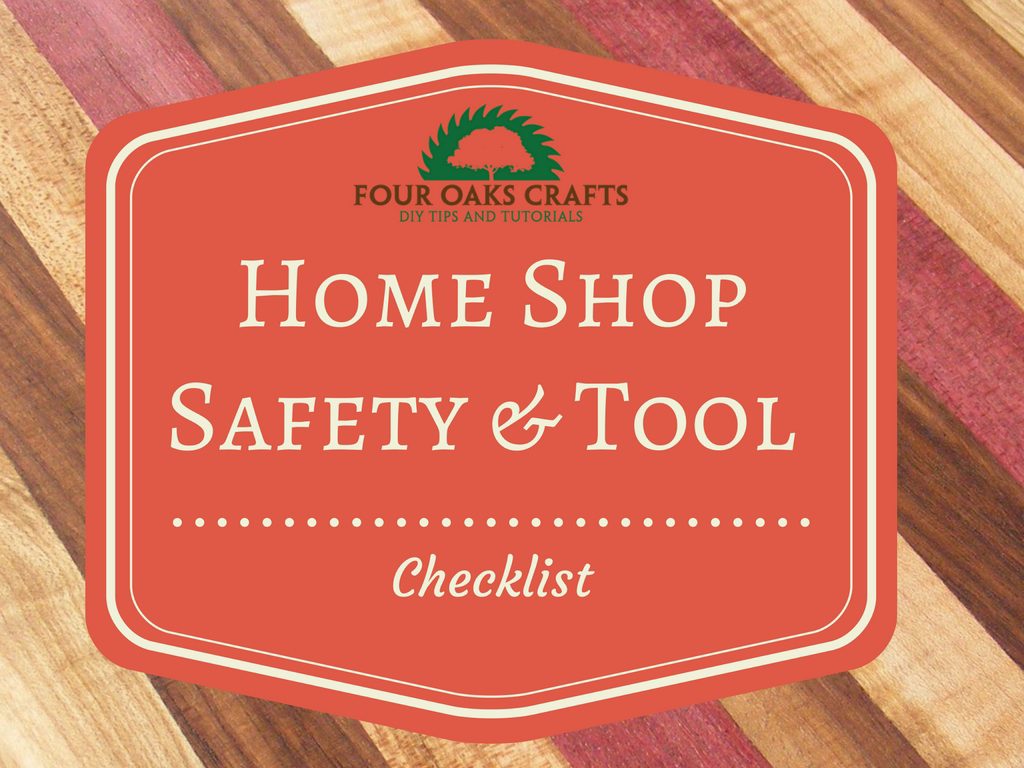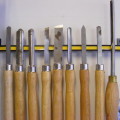January’s the month for New Year’s resolutions. But you don’t have to get caught up in the hype or the commercial exploitation of making a new commitment. Anytime is a good time to make a resolution. The important thing is to make ones that are reasonable for you and you can stay committed to. Over the past few years, I’ve tried to make some new commitments to my woodworking hobby and my family. So, I decided to write them down in this article and share them with you: 12 Shop Resolutions for Woodworkers.
I hope these ideas don’t come across as preachy; that’s not my intention at all. I certainly don’t live up to all these resolutions every waking moment. And I didn’t commit to everyone of them at once. To do things well, it takes time. And often learning from failure so you can learn to succeed.
Many of these ideas will be on the practical side, but some are philosophical. Anyway, I hope they may help or inspire you. leave a comment, because I would be very interested to hear about your shop resolutions for this year and beyond.
1. Follow your mom’s advice.
Truth is this is probably the only advice you need. Things like: “put your stuff away”; “everything has its place”; “put the cap back on”; “clean up your mess”; “read the instructions”; all come to mind.
Let’s just say it — moms are brilliant!
So look around your shop and assign a place for everything. Then try to be consistent with keeping your tools and materials in their places. Put the cap back on it.
Remember what your mom taught you.
2. Share your space.
Some of you may not have this issue, but I gladly share my space with my son who stores his 1978 Camero project car in my shop/garage.
That only gives me about a 10 ft by 20 ft space to work with, but it’s worth it. My son is studying to become an engineer and having this car means the world to him. I wouldn’t want to take that away from him.
So share your shop space with others.
Keep the family happy.
You could always replace a shop, but relationships can be another story.
3. Separate storage from your shop area.
I cleaned out my shop one weekend and realized how much stuff was NOT related to woodworking. I’m talking about stuff I had not touched in years: camping gear, old, dried-up paint, used motor oil, empty boxes, warped & cracked boards, abandoned car parts, etc.
First, I had to decide if I needed to keep or throw it away or give it away (see the next resolution on the list).
For the things I needed to keep, I realized I could be storing it in my attic space or outdoor shed. When I did that, it really opened up drawer and cabinet space where I could store my woodworking tools and materials.
I now have something strange all over my workbench — open workspace!! My workbench is no longer the “shelf.”
So, take inventory of the things being stored in your shop. Do they belong there or somewhere else?
Hey — mom’s advice has shown up again.
4. Throw it away or give it away.
I had to face the music for my tendency to hoard. If I wasn’t using it, should I throw it away or give it away? I also had to dispel the thought, “you know, someday this might come in handy.”
“Someday” is an elusive son-of-a-gun.
So, I use a couple of criteria:
If it’s junk, throw it away.
If it could benefit someone, then give it away.
Seems like I’m now giving my father and my son many of my tool hand-me-downs.
Then there’s Goodwill and a place you may not know about — Habitat for Humanity ReStores.
And don’t forget about your local church. Someone might need one of your extra hammers.
5. Take the minimal approach.
I love the word minimal. Lately, I’ve been taking that approach in many areas of my life. Or trying, at least.
What does this mean for your shop?
Not trying to preach here or get on a soapbox, but it could mean asking yourself questions like this:
Do I need 20 different saws, hammers, screwdrivers, etc.?
Do I need to buy that tool just because it’s on sale?
Is there more than one way to do this project?
How often will I build this?
Am I ever going to use that again?
Buy it or rent it or borrow it?
I think minimal means focusing on the few things(and relationships) that bring you the most value and/or joy. And not getting wrapped up in the need to possess more.
Let’s face it — the more you have, the more you have to store and maintain.
And sometimes hunt, because you forgot where you put it — LOL.
6. Add storage space.
If you’ve done all the above, I’m thinking you may not need to add a lot of new storage space. But you should be taking advantage of space not being used in your shop.
Don’t spend a lot of money here. For little cash outlay, you can easily build your own shelves and/or cabinets. Or get used storage items.
This past year, I was able to find some cheap used cabinets at my local Habitat for Humanity ReStore. You should seriously check out these stores. They have excellent used stuff.
If you’re shop’s in a garage — like I am — don’t forget the storage space near the ceiling, above that garage door or above your work benches. Again, don’t create a new place to store junk, but you might want to store woodworking gear you don’t use very often.
This is a great place to store lumber, while keeping it dry and flat.
7. Be safe and keep yourself healthy.
Never take safety for granted.
I like to tell folks to always read about their tools, wear their protective gear, and get educated about what they’re doing. I pay special attention to what I expose my skin and lungs too.
Dust can create problems for your health, so invest in dust collection and filtration equipment. Buy a good shop vac and periodically keep your shop clean.
Superglueing your fingers together isn’t fun. Get a box of nitrile gloves.
Remember, you want to enjoy your hobby as long as you can, with as less pain as possible.
8. Invest in training.
Getting better at something — anything — involves getting some training. And, yes, that sometimes means forking over a little money, but you don’t have to go crazy.
Woodworking stores like Rockler and Woodcraft usually offer weekly or monthly classes that won’t break the bank.
There’s also a great supply of books out there.
And if you’re on a tight budget, plenty of free how-to videos available online.
See if there are any woodworking or DIY clubs in your area. They may offer free demos or training.
9. Don’t get mad. Don’t give up.
Anything can become frustrating — even the beautiful hobby of woodworking.
I made a resolution many years ago not to let failure bother me. Failure only leads to learning and success. I still get frustrated when things don’t go my way. But when they don’t, I take a break.
I do something different: eat a sandwich, watch another Steve Ramsey video, play with the dog.
I might not come back to the shop until the following day.
I’ll start over if I have to.
And I don’t apologize when I have to veer from the plans. Sometimes the greatest innovations are born when people stray from the original plan.
10. Spend money wisely.
This goes along with all the other resolutions and tips I’ve mentioned thus far.
For tools, I try to shop for good deals. I don’t buy junk, but I don’t buy the high-end either. I buy tools for –number one — their usefulness and then — quality.
I try to ask myself what’s the minimal tool I can start out with? Can I use hand tools? Can I use this tool on multiple projects? Will this tool save me time and make me a more efficient woodworker?
Pace yourself. You don’t have to have the “complete” shop overnight.
BTW, if you’d like to get a copy of my Home Shop Safety & Tool Checklist, please consider signing up for my newsletter. Look for the signup form to the left or at the end of this blog.
11. Put your family first.
It’s easy to get addicted to a hobby, especially woodworking. And soon you may find yourself sinking every waking hour (not to mention dollars) into it.
Just don’t forget to spend time with you spouse and kids. Remember: They need you and your attention.
If possible, get them involved. Woodworking can often be a one-person show, but it’s better when you can bring family and friends into your hobby.
Ask them what you can make for them. Get them in on the design. That way you can reach something of a balance, and they’ll realize that you are thinking of them and watching out for them.
BTW, this works great for mother-in-laws too — LOL.
12. Don’t feel guilty for having a hobby.
Hobbies are good for you. I’ve even written an article about the 10 Benefits of Hobbies where I expand on this idea.
We all need diversions from the stress in our lives.
And maybe — just maybe — this will make us better husbands, wives, fathers, mothers, workers, and servants.
For some, it may even lead to another source of income and vocation.
From what I know about God, He has always been a creator.
He created us to be creators.
So go create something beautiful today!
Thanks for reading about my 12 shop resolutions for woodworkers. If you’d like to keep updated on my projects and articles, please consider joining my newsletter. And when you join, I’ll also send you my Home Shop Safety & Tool Checklist.
Please leave a comment and don’t forget to share your shop resolutions.

Are you starting up a new shop? Want to work safer in your shop? To help you answer these questions I've put together a 2-part checklist -- Home Shop Safety & Tool Checklist.
I will also send you updates of my latest woodworking and DIY projects. You can get all this by subscribing to my free email newsletter.







Great article, really well written. All of these things are so relevant to every area of life not just the shop!
Thanks for sharing 🙂
Hey, thanks for the comment!